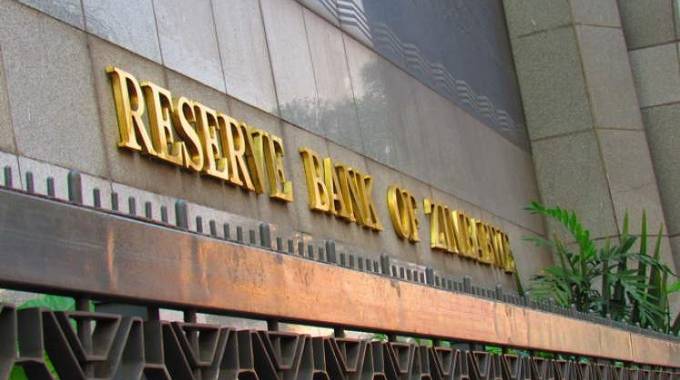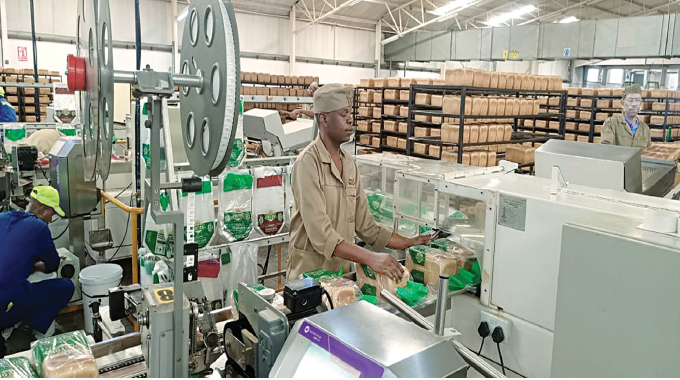Businesses tread cautiously on cash transactions

Oliver Kazunga, Senior Business Reporter
CASH transactions have become a scary practice in the wake of the outbreak of Covid-19 with cashiers and till operators in most shops in Bulawayo now using gloves and masks to prevent any potential infections from handling cash.
The move comes as the Reserve Bank of Zimbabwe (RBZ) has called for increased use of electronic transactions to minimise the risk of coronavirus infections through hands exchanging cash. Health experts say the virus can spread from person to person by touching a surface or object that has the virus on it and then touching mouth, nose, or possibly eyes and as such using cash is now risky.
A snap survey carried out by Business Chronicle in Bulawayo yesterday revealed that banking halls, fast food houses and several service shops including supermarkets, were demanding that clients be sanitised upon entrance while workers were putting on masks and gloves to minimise the risk of exposure to the virus.
People were however in queues at banks to withdraw cash despite the risk of using it and were not maintaining the recommended one-metre social distancing to minimise risk to exposure. Those interviewed said they were aware of the social distancing guidelines but were used to the habit and find it hard to implement.
“We have heard about the need to maintain a social distance of one metre, but that is difficult for us because we are accustomed to queueing close to each other.
“For long queues such as this one, its practically impossible to maintain a one metre distance,” said one of the Stewart Bank’s clients, Mr Nathan Ncube.
Chicken Slice branch manager, Mr Aaron Machemedze, said they were now sanitising clients before serving them. We’ve taken this pandemic seriously and as part of precautionary measures to eliminate the spread of the diseases, our cashiers who handle cash are sanitised after every five minutes as they conduct their business,” he said.
“We’ve also put it forward to our senior management for the organisation to provide masks and gloves.”
In a statement issued at the weekend, the RBZ urged the transacting public to optimise the use of electronic and online banking services to mitigate possible transmission of Covid-19, which was detected in China in December and has spread across the globe, killing thousands of people.
Zimbabwe has confirmed two cases of the diseases and one death. The RBZ said it was working closely with financial service providers to monitor and take appropriate precautionary measures to support the economy and minimise the adverse impact of the pandemic on the banking and transacting public.
“In order to ensure that banking and payment services continue to be available at all times, while promoting crowd containment and social distancing, financial service providers should ensure uninterrupted access to online banking and payment services,” it said.
Such online banking and payment services include point of sale, international payments, real time gross settlement, mobile banking, mobile money payments and remittance services.
“The banking and transacting public is encouraged to optimise the use of available electronic and online banking services, which remain the safest and most secure forms of transacting,” said the central bank.
“All financial services providers should promote high standards of hygiene to mitigate or minimise any possible transmission and to safeguard the health of the banking and transacting public as well as bank’s staff.
“In this regard, financial service providers must stand ready to activate their business continuity and contingency plans, where necessary, to deal with any adverse operational events as they may occur.”
The monetary authority said it would continue monitoring the developments in the financial services industry to ensure the sector remains stable.
Meanwhile, mobile money operator, EcoCash has announced increased daily and monthly transaction limits for merchants or bill payments and for single transaction.
The monthly limit for customers not linked to bank or debit card, which used to have a transaction limit of $10 000, has been increased to $20 000. The monthly limit for customers linked to a debit card used to be $25 000, but has been raised to $35 000.
Customers linked to a bank used to have a monthly limit of $50 000 but that has since been raised to $150 000 and the executive grade that had a monthly limit of $100 000 will now transact up to $250 000. While the move is expected to bring relief to the transacting public, the development is also in sync with the RBZ’s call to promoting use of electronic and mobile money transactions to mitigate the spread of Covid-19 in the country.
Similarly, state-owned fixed telecommunications operator, TelOne says in light of Covid-19 outbreak, it was rolling out a 10 percent discount on its Home Intense unlimited bundle to schools providing e-learning and organisations wishing to have their staff work away from company premises.
“The world has been hit by the Covid-19 outbreak and we, as TelOne, understand the adverse economic impact it has brought. To help you contain and reduce your risk of being infected, we are offering a 10 percent discount on our Home Intense unlimited bundle to schools providing e-learning and organisations wishing to have their staff work from home,” said TelOne. — @okazunga











Comments